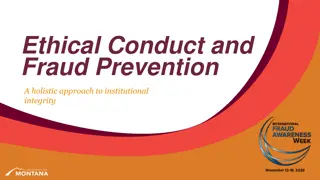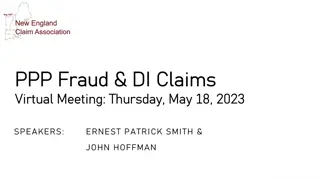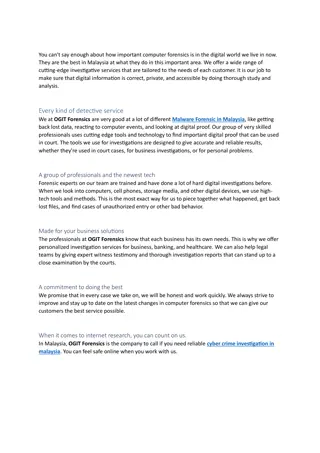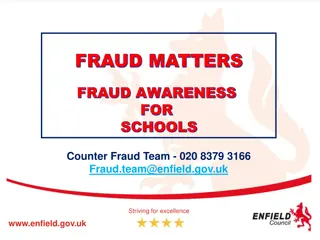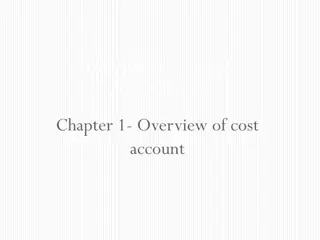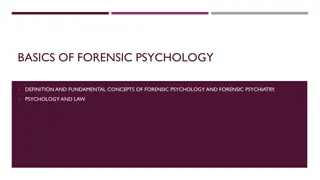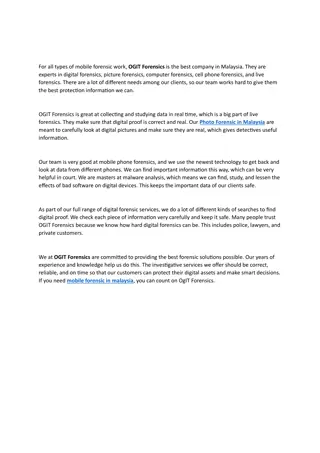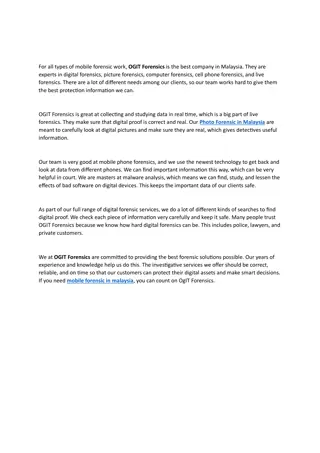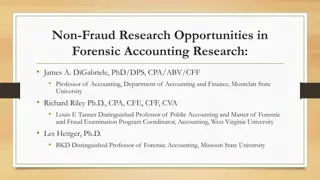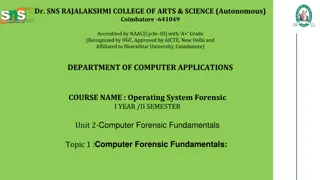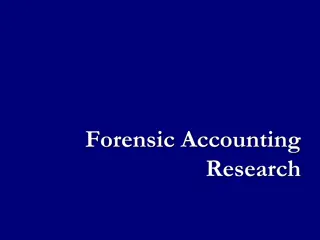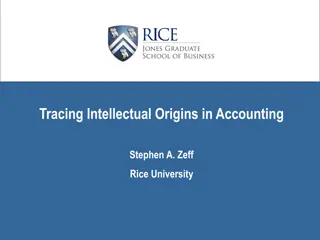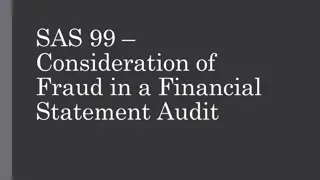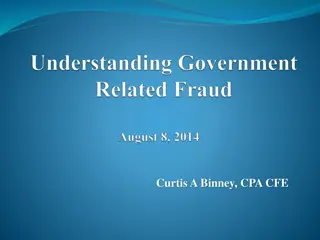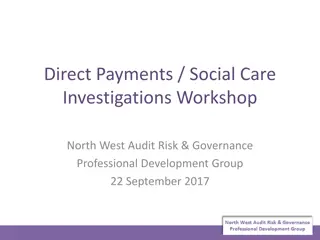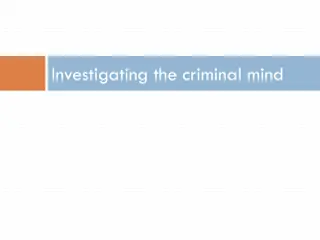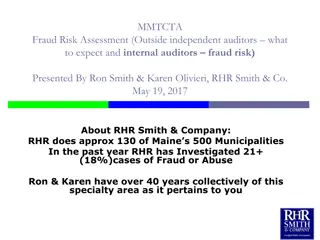Understanding Fraud and Forensic Accounting
Fraud is defined as deception to gain an unlawful advantage. Various legal definitions of fraud under Indian law are discussed, including those under the Indian Penal Code, Indian Contract Act, and Companies Act. The concept of forensic accounting in detecting and investigating fraud is also introduced, emphasizing the crucial skills and techniques involved in uncovering financial deception.
Download Presentation

Please find below an Image/Link to download the presentation.
The content on the website is provided AS IS for your information and personal use only. It may not be sold, licensed, or shared on other websites without obtaining consent from the author. Download presentation by click this link. If you encounter any issues during the download, it is possible that the publisher has removed the file from their server.
E N D
Presentation Transcript
Forensic Accounting - Skeptical skills to detect fraud
What is Fraud? As per Business Dictionary, Fraud is an act or course of deception, an intentional concealment, omission, or perversion of truth, to: (1) Gain unlawful or unfair advantage, (2) Induce another to part with some valuable item or surrender a legal right, or (3) Inflict injury in some manner. In the Indian Penal Code, Section 25 defines as to what would amount to fraudulently . As per the definition, fraudulently refers A person is said to do a thing fraudulently if he does that thing with intent to defraud but not otherwise. In general, fraud is an act of deliberate deception with the design of securing something by taking unfair advantage of another. It is a deception in order to gain by another s loss. Wilful fraud is a criminal offence which calls for severe penalties, and its prosecution and punishment (like that of a murder) is not bound by the statute of limitation.
Fraud under Indian Contract Act, 1872 Fraud means and includes any of the following acts committed by a party to a contract, or with his connivance, or by his agents, with intent to deceive another party thereto his agent, or to induce him to enter into the contract. Section 17 (1) the suggestion as to a fact of that which is not by one who does not believe it to be true - is known as SUGGESTIO FALSI or suggestion of falsehood. Section 17 (2) the active concealment of a fact by one having the knowledge or belief of the fact is known as SUPPRESIO VERI or suppression of a fact. Section 17 (3) a promise made without any intention of performing it. Section 17 (4) any other Act fitted or designed to deceive. Section 17 (5) any such act or omission as the law specially declares to be fraudulent Explanation to Section 17 The mere silence as to a fact likely to affect the willingness of a person to enter into a contract is not fraud. However, such silence is to be held as fraud, if the circumstances of the case that It is the duty of the person keeping silence to speak That his silence in itself is equivalent to speech.
Fraud under Companies Act, 2013 Corporate Fraud is a Fraud in relation to affairs of a company or any corporate body as defined in the explanations of Section 447 of Companies Act 2013, which includes a. Any act, b. Omission, c. Concealment of any fact or d. Abuse of position committed by any person or any other person with the connivance in any manner, - i. with intent to deceive, ii. to gain undue advantage from, or iii. to injure the interests of, a. the company or b. its shareholders or c. its creditors or any other person, whether or not there is any wrongful gain or wrongful loss.
Forensic Audit The word forensic comes from the Latin term for nsis, meaning "of or before the forum . A forensic audit is an analysis and review of the financial records of a company or person to extract facts, which can be used in a court of law. Jack Bologna and Robert defined Forensic Audit as the application of financial skills and an investigative mentality to unresolved issues, conducted within the context of the rules of evidence. As a discipline, it encompasses financial expertise, fraud knowledge, and a strong knowledge and understanding of business reality and the working of the legal system.
Forensic Audit Collin Greenland defines that forensic accounting (or auditing) is the integration of accounting, auditing and investigative skills in order to provide an accounting analysis suitable for the resolution of disputes (usually but not exclusively) in the courts. A Forensic Audit can be conducted in order to prosecute a party for fraud, embezzlement or other financial claims.
Forensic Audit Vs. Forensic Accounting There are two types of frauds in business world according to its gamut: Frauds against business: Committed by the Employees, Vendors or Clients or in connivance of all these parties Frauds for business: Generally committed by the promoters and shareholders of the business to deceit the bankers, revenue authorities and regulators. A forensic accounting assignment relates to Frauds Against the Business. This issue may involve employee fraud or a dispute with a vendor or customer. Forensic auditing related to Frauds for the business. Forensic audits relate directly to financial statement frauds whereas forensic accounting require investigative techniques and technology. The auditor s report must meet the standards for presentation in court. Forensic Accounting assignments are complex in nature. Forensic Accountants answer the questions such as who perpetrated the fraud? what was the modus operandi ? and what were the fraud losses? On the other hand forensic auditors are engaged to check the trail of money. Source of funds to utilization, forensic auditors answer the questions such as motives of the businesses behind the fraud.
Need and objectives of Forensic audit and statue When is Forensic Audit required? wherever an entity s finances present a legal concern, in cases of suspected embezzlement or fraud, to determine tax liability, to investigate allegations of bribery, to strengthen a company s already good business practices, to either determine the lost income as a result of a fraudulent financial/ operational report, or to determine the damage that falsified reports caused to shareholders, clients or employees. Forensic Audit under various statues: Companies Act, 2013 & The Companies (Auditor s Report) Order, 2016 Insolvency & Bankruptcy code, 2016 SEBI Act, 1992 Income Tax Act, 1961 & Goods & Service Tax Act RERA, 2016
Benefits and advantages of Forensic Audit Detection and accountability of financial crimes Detection of asset misappropriation Detection of financial statement fraud Fraud identification and prevention Making sound investment decisions Formulation of economic policies Strong control system Enhanced effectiveness and improved efficiency Reduced exploitation risk Avoidance of legal problems Improved brand reputation
Conducting Forensic Audit: Planning & Procedures STEP ONE: Begin the case (respond to complaint, etc.) STEP TWO: Evaluate the allegations or suspicions STEP THREE: Conduct due diligence background checks STEP FOUR: Complete the internal stage of the investigation STEP FIVE: Check for predication and get organized STEP SIX: Begin the external investigation STEP SEVEN: Prove Illicit Payments STEP EIGHT: Obtain the cooperation of an inside witness STEP NINE: Interview the primary subject STEP TEN: Prepare the final report
Conducting Forensic Audit: Investigative Tools 1. Public document reviews and background investigations 2. Interviews of knowledgeable persons (the witness and the accused) 3. Confidential sources and informants 4. Laboratory analysis of physical and electronic evidence (Physical Forensic Analysis which includes Handwriting analysis, fingerprint analysis, document dating, ink sampling , simulated forgery of signatures analysis, Computer Forensics which includes hard disk imaging, E-mail analysis, search for erased files, analyze use & possible misuse of office computers for personal use, ensure chain of custody for electronic evidence.) 5. Electronic and physical surveillance. 6. Undercover operations 7. Analytical procedures (Using of Ratio analysis, Trend or time series analysis, Horizontal and vertical analysis and use of work-back ratios techniques to analyze financial statement)
Conducting Forensic Audit: Red Flags & Green Flags Red Flags: Red flags are nothing but symptoms or indicator of situation of fraud. A red flag is a set of circumstances that are unusual in nature or vary from the normal activity. It is a signal that something is out of the ordinary and may need to be investigated further. Examples: Employee lifestyle changes: expensive cars, jewelry, homes, clothes Refusal to take vacation or sick leave Reluctance to provide information to auditors Excessive number of year end transactions Refusal by company or division to use serial numbered documents (receipts) Green Flags: A Green flag is a flag which denotes a too good to be true scenario . Examples: his pocket A case where an employee doesn't take travel advance but always pays from
Live cases Forensic Audit on PNB Scam: In the starting of January, 2018, PNB informed the BSE (Bombay Stock Exchange) that it has detected some fraudulent and unauthorized transactions in one of its branches in Mumbai to the tune of $ 1771.69 million (approx.). Following the announcement, the share price of the state-owned bank plunged 10% Forensic Audit on Dena Bank: The Finance Ministry has ordered a forensic audit of Dena Bank and Oriental Bank of Commerce after some of their Mumbai-based branches allegedly misappropriated funds worth Rs. 437 crore, mobilised through fixed deposits. In the case of Dena Bank, the misappropriation was to the tune of Rs. 257 crore and related to funds mobilised from seven corporate. In Oriental Bank s case, it related to misappropriation of funds amounting to Rs. 180 crore, reportedly belonging to the Jawaharlal Nehru Port Trust.
Opportunities Forensic accountants ferret out questionable or downright fraudulent financial record-keeping practices. Their skills are in demand in advance of proposed mergers and acquisitions as well as in criminal investigations and legal cases. They may work for companies, individuals, government agencies, or nonprofits.
CA Rahul D. Ladhani CA Rahul D. Ladhani FCA, ACS, BCom (A&F), DISA(ICA), DIRM(ICA) Email: ladhanirahul@gmail.com Web: www.calac.in



